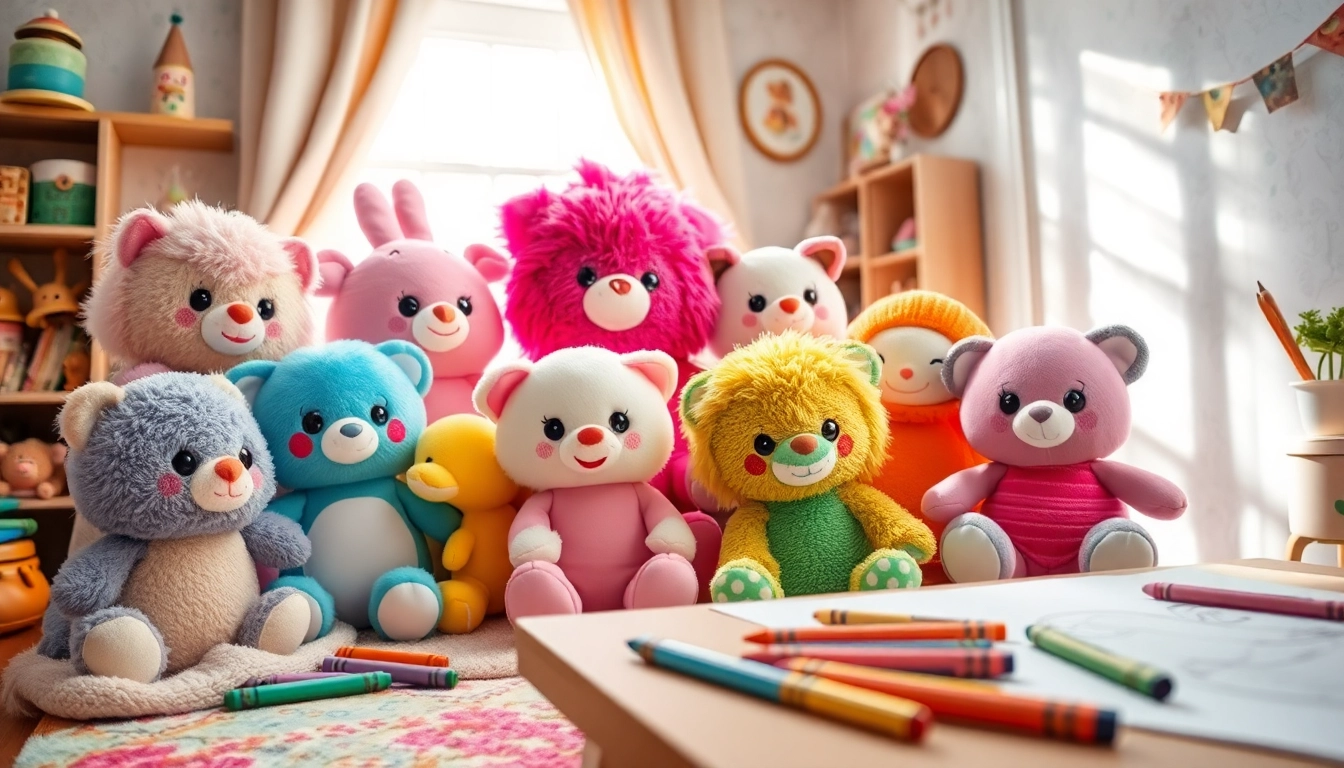Ultimate Guide to Custom Plushies: Create Your Dream Design

Understanding Custom Plushies
What Are Custom Plushies?
Custom plushies are unique stuffed toys crafted according to specific designs, concepts, or character illustrations provided by customers. Unlike mass-produced plush toys, these handmade pieces offer a personal touch and can encapsulate a wide range of emotions, themes, or characters. Create a plush representation of a beloved pet, a character from a story, or a unique design that you envision. The opportunities are endless, allowing for personalization in details such as colors, sizes, textures, and additional features like sound effects or special accessories.
The Benefits of Custom Plushies
Opting for custom plushies comes with a multitude of advantages. Firstly, they offer a distinctive gift option that stands out from typical retail purchases. Since custom plushies can encapsulate specific characteristics or memories, they make for sentimental gifts that are cherished deeply. Secondly, they boost emotional connections; personalized toys can help strengthen bonds between parents and children, friends, or within romantic relationships.
Additionally, custom plushies are ideal for businesses aiming to build brand loyalty. Companies can create mascot plushies that connect with their audience, enhancing brand visibility. Moreover, custom plush toys can serve as perfect promotional items, helping to elevate marketing campaigns while effectively engaging customers.
Common Uses for Custom Plushies
The applications of custom plushies are vast. They are commonly used as:
- Personalized gifts for occasions such as birthdays, anniversaries, or holidays.
- Memorabilia for special events like weddings or graduations.
- Promotional items in corporate gifting.
- Merchandise for artists, creators, or influencers looking to diversify their offerings.
- Therapeutic toys for children, helping with emotional engagement and comfort.
Designing Your Custom Plushies
Choosing Materials for Custom Plushies
The selection of materials plays a crucial role in the design process of custom plushies. Common materials include soft fabrics like fleece, velour, and minky, but it’s essential to consider other elements such as fill materials (e.g., polyester fiberfill, foam) and any accessories like buttons or safety eyes. The choice of materials not only impacts the aesthetic appeal but also affects the durability and comfort of the final product.
When choosing materials, consider factors like age appropriateness (especially important for children’s products), washability, and hypoallergenic properties. Some manufacturers offer eco-friendly options that can appeal to environmentally conscious consumers.
Design Inspirations for Custom Plushies
Finding the right inspiration can kickstart the creative process for designing custom plushies. Popular sources include:
- Artistic Creations: Existing drawings, paintings, or illustrations can be transformed into plush forms.
- Character Concepts: Characters from books, games, or movies offer rich groundwork for design.
- Nature and Animals: Whether it’s a favorite pet or a wild creature, nature can provide endless ideas.
- Abstract Ideas: Concepts or emotions can be visualized in unique plush shapes, allowing for creative expression.
Tips for a Unique Custom Plushies Design
Designing a unique custom plush toy involves considering several elements:
- Sketch Your Ideas: Before settling on a design, sketch several concepts to identify the direction that resonates.
- Understand Proportions: Be mindful of how the proportions will translate into three dimensions to ensure your design is practical.
- Play with Textures: Experiment with varied textures and materials to create a visually appealing and tactile experience.
- Feedback Loop: Consider sharing your design ideas with friends or stakeholders to gather feedback and enhance the final concept.
Manufacturing Custom Plushies
The Production Process of Custom Plushies
The manufacturing process for custom plushies typically begins with the initial design stages, where ideas are drafted and finalized. From there, prototypes are created to ensure that the design translates well into the physical product. This stage is critical as it helps in identifying any design flaws that may not be evident on paper.
Once the prototype meets approval, mass production can begin. This involves cutting individual pieces of fabric, sewing them together, stuffing them, and adding any embellishments. Quality control checks are essential throughout the production process to guarantee that each plush toy meets the promised standards.
Quality Control for Custom Plushies
Quality control is vital in the production of custom plushies to ensure safety, durability, and overall finishing. At various stages of production, checks should be made to ensure the following:
- Safety Standards: Compliance with safety regulations must be ensured, particularly for products aimed at children (e.g., no small parts, flame-retardant materials).
- Consistency: Each finished plush toy must match the quality of the original prototype. Variations can lead to customer dissatisfaction.
- Finishing Touches: Attention to detail such as stitching quality and the evenness of coloring is crucial to uphold the plush’s intended aesthetic.
Finding the Right Manufacturer for Custom Plushies
The choice of manufacturer can significantly impact the outcome of your custom plush toys. Look for manufacturers that specialize in custom plush production, preferably with an extensive portfolio showcasing previous work. It is advisable to consider factors such as:
- Experience: Manufacturers with a long-standing history are more likely to have refined production processes and expertise.
- Communication: Strong communication is critical to express your design needs and resolve potential issues early in production.
- Reviews and References: Evaluating customer feedback and references can provide insights into a manufacturer’s reliability and quality of work.
Marketing Custom Plushies
Strategies to Sell Custom Plushies
When it comes to marketing custom plushies, various strategies can be employed to maximize reach and engagement:
- Utilize E-commerce Platforms: Sell your plushies on e-commerce platforms to reach a wider audience. Create engaging product listings with high-quality images and compelling descriptions.
- Attend Craft Fairs and Markets: Travel to local markets or craft fairs to showcase your products directly to potential customers.
- Collaborate with Influencers: Partner with influencers who resonate with your target demographic. Their endorsement can open doors to new audiences and secure trust.
- Implement SEO Strategies: Optimize your website or online store for search engines, focusing on keywords like custom plushies to attract organic traffic.
Building a Brand around Custom Plushies
To cultivate a brand, start by defining your unique selling proposition. What distinguishes your custom plushies from others? Craft a compelling brand story that resonates with your audience and communicates your passion. Consider the following:
- Consistent Branding: Ensure that your branding (logo, colors, typography) is consistent across all channels.
- Customer Engagement: Engage with your audience through newsletters, social media, and interactive content to build a community around your brand.
- Merchandising: Consider creating an entire lineup of products, enhancing your brand’s visibility and providing customers with options they will enjoy.
Utilizing Social Media for Custom Plushies Promotion
Social media is a powerful tool for promoting your custom plushies. Utilize platforms like Instagram and Pinterest to visually engage with users. Share behind-the-scenes content showing the design and manufacturing processes, which can intrigue potential customers and drive engagement.
Running campaigns, utilizing hashtags, and creating engaging content such as polls or Q&A sessions can foster interactive spaces that encourage customer participation. User-generated content showcasing customers’ experiences with your plushies can serve as powerful testimonials, attracting new buyers.
Customer Engagement with Custom Plushies
Gathering Feedback on Custom Plushies
Feedback is invaluable for enhancing product offerings. After customers purchase custom plushies, encourage them to share their thoughts through surveys or reviews. Analyzing this feedback can unveil insights into what works, what needs improvement, and potential opportunities for new products.
Consider implementing follow-up emails requesting feedback on product quality, customer service, and overall experience. Analyzing responses can guide future design iterations and marketing strategies, ensuring alignment with customer expectations.
Creating a Community for Custom Plushies Enthusiasts
Building a community around your custom plushies can strengthen customer loyalty. Consider creating a dedicated space, such as a Facebook group or a forum, where fans can connect, share designs, and discuss their plush initiatives. Regularly engage with community members by sharing content, hosting live chats, and encouraging discussions about their plushies.
Engaging with your community not only enhances brand loyalty but can also inspire new design ideas based on community input.
Analyzing Sales Performance of Custom Plushies
Tracking sales performance is essential for understanding market trends and operational efficiency. Utilize analytics tools to monitor key performance indicators, such as:
- Sales Trends: Identify which plushies are bestsellers and investigate the reasons behind their popularity.
- Customer Demographics: Analyze data to understand who your customers are, enabling more targeted marketing.
- Return Rates: Investigate return rates to identify potential quality control issues or customer dissatisfaction.
Regularly assessing these metrics provides the information necessary to refine product offerings and marketing strategies, ensuring long-term success in the competitive custom plush market.






